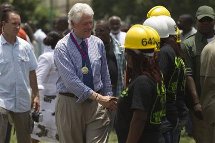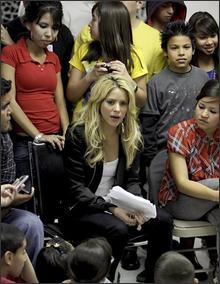PORT-AU-PRINCE, Haiti’s president handed out medals to celebrities, aid-group directors and politicians for post-earthquake work Monday in a ceremony designed to beat back criticism of an uneven recovery that has left 1.6 million people homeless and destitute six months to the day since the disaster.Just out of sight, baking in the oppressive noonday sun, were the fraying tarps of tens of thousands of homeless who live on the Champ de Mars, once a grassy promenade surrounding the government complex.
“That is just a way to put the people to sleep. But the people are suffering,” Edouard James, a 32-year-old vendor said when he was told of the ceremony. Unable to find a job with his degree in diplomacy, he sells pirated DVDs in a tarp-covered booth.”We are tired of the NGOs … saying we will have a better life and better conditions, and then nothing happens,” he said.Twenty-three honorees – including actor Sean Penn, CNN anchor Anderson Cooper and the head of the U.N. peacekeeping mission – crossed a podium in front of the crushed, unrepaired national palace to steady applause. Some smiling, some solemn, each received medals and certificates deeming them Knights of the National Order of Honor and Merit.
 President Rene Preval, whose successor is to be elected in November, defended the response to the quake. He said in two speeches during the ceremony that hard-to-see successes – like the avoidance of massive disease outbreaks and violence – obviates the perception that not enough has been done.”There are people who did not see all the big efforts that were deployed during the emergency stage: distributing tents, water, food, installing latrines, providing health care during the six months that have just gone by,” Preval said. “It is a major, major task.”The ceremony was resolutely upbeat. The focus was on successes past and plans going forward, with little talk of the 230,000 to 300,000 people killed in the magnitude-7 temblor.
President Rene Preval, whose successor is to be elected in November, defended the response to the quake. He said in two speeches during the ceremony that hard-to-see successes – like the avoidance of massive disease outbreaks and violence – obviates the perception that not enough has been done.”There are people who did not see all the big efforts that were deployed during the emergency stage: distributing tents, water, food, installing latrines, providing health care during the six months that have just gone by,” Preval said. “It is a major, major task.”The ceremony was resolutely upbeat. The focus was on successes past and plans going forward, with little talk of the 230,000 to 300,000 people killed in the magnitude-7 temblor.
The president and prime minister, Jean-Max Bellerive, both used the occasion to announce that a six-month emergency phase has ended and that reconstruction has begun.The distinction was lost on some Haitians.”I don’t know if I’m mad or happy,” Anne Bernard, a 24-year-old mother of two living in a metal shack a few hundred yards from the national palace. “All I know is they haven’t done anything.”
The most visible early-emergency programs like massive food distributions have stopped, and there still are few tangible effects of $3.1 billion in humanitarian aid for all but a handful of those left homeless by the quake, who rely on plastic tarps for shelter.Tarp-and-tent camps are growing instead of shrinking. Just 5,657 transitional shelters have been built of a promised 125,000, which even if completed would not be nearly enough for everyone.When building materials finally get through customs, there is nowhere to put them. Fights over land rights, customs delays and systemically slow coordination between aid groups and the government have hampered nearly everything. The Associated Press reported Sunday that the location of the largest of two relocation camps provided by the government was the result of an inside deal.Shortly after the ceremony ended, that camp flooded in a sudden summer squal, with 94 deluxe tents collapsing in the wind and rain.Compounding the problem in the city is that almost no rubble has been cleared. Preval said Monday it would take $1.5 billion to remove all of it.
Meanwhile donors have met 10 percent of a promised $5.3 billion in reconstruction aid – separate from the humanitarian aid – mostly by forgiving debts, not providing cash.Clinton, who also received a medal, said it will be his mission in coming weeks to make sure donors meet their pledges. He acknowledged that more could have been done, but that recovery has so far been faster than the rebuilding of coastal Indonesia following the 2004 tsunami.”To those who say we have not done enough, I think all of us who are working in this area agree this is a harder job (than the tsunami),” Clinton said. “Viewed comparatively I think the Haitian government and the people who are working here have done well in the last six months.”
CNN’s Cooper, who spent parts of January and February in Haiti following the quake and had not returned since, said he found out about the award while getting ready to board his plane to Haiti on Sunday.”I thought a long time about not accepting it. We finally came to the opinion that it was recognition by the country for all journalists,” he told resident reporters after the ceremony. “I don’t think this in any way impacts the desire or willingness to be critical of the government.”(AP)


